RDAWEP has been working with the oyster industry and Government to help address ongoing challenges caused by the POMS virus.
The following information has been provided by Primary Industries and Regions SA (PIRSA):
Routine research, aimed at improving early detection of the POMS virus, detected the presence of the virus in feral Pacific Oysters in the Port River in February 2018. At this stage POMS has not been detected in South Australian oyster farming areas.
PIRSA will continue to monitor and test oysters in the Port River, and any other possible areas of risk. All strategies to mitigate the risk of spread of the virus are being investigated.
To reduce the risk of POMS spreading, PIRSA has implemented a ban on the removal of all bivalve organisms (oysters, mussels, cockles) from the Port River until further notice. Bivalves should not be taken from the Port River area for any purpose including bait or berley.
PIRSA is working with key fishing and aquaculture sectors and boat owners to ensure vessels are clean and to reduce the risk of the virus spreading.
The State Government will provide new support measures to help the South Australian oyster industry return to business as usual, as part of a $2.6 million industry recovery package.
The costs of services associated with oyster leases and licences will be waived for the next two years, to assist South Australia’s 155 oyster businesses get back on their feet. A dedicated liaison officer will be situated in Port Lincoln, providing a central point of contact and assistance to all oyster growers.
The $1.6 million fee relief is in addition to more than $1 million in State Government financial and operational assistance provided to the industry since the devastating outbreak of Pacific Oyster Mortality Syndrome (POMS) in Tasmania in February 2016.
The outbreak of POMS in Tasmania resulted in an immediate ban on the importation of all live oysters and oyster farming equipment from Tasmania into South Australia, to ensure POMS did not enter this State. This ban remains in place. South Australian Oyster Growers Association remained confident it was being protected by the strong biosecurity systems South Australia had in place.
As our oyster industry typically received 80 percent of its supply of Pacific Oyster spat from Tasmania, there is now a significant shortage of spat, which continues to have substantial production and employment impacts for South Australian oyster growers.
State Government assistance has helped to increase spat production from two local existing hatcheries and the South Australian Research and Development Institute (SARDI), along with the establishment of two new hatcheries on the Eyre Peninsula.
This package will provide further assistance by waiving annual fees for aquaculture oyster lease and licence holders, including for the Shellfish Quality Assurance Program (SASQAP), for the 2018-19 and 2019-20 financial years. There are currently 330 oyster licences and 291 oyster leases in South Australia.
Agriculture, Food and Fisheries Minister Leon Bignell said “This is not going to be an overnight solution, but we are committed to standing alongside our world-renowned oyster growers throughout this recovery process until they are back on their feet”.
Rob Kerin, Chair of SAOGA stated that “The oyster industry is one of our icon industries and this support is critical for its survival over the next two years. The operational and financial assistance provided by the State Government working closely with industry – including SAOGA, oyster growers and hatcheries – has saved our local industry from a total disaster. We will continue working in partnership to ensure the industry emerges from this difficult time, thriving and more resilient than ever in the long-term”.

